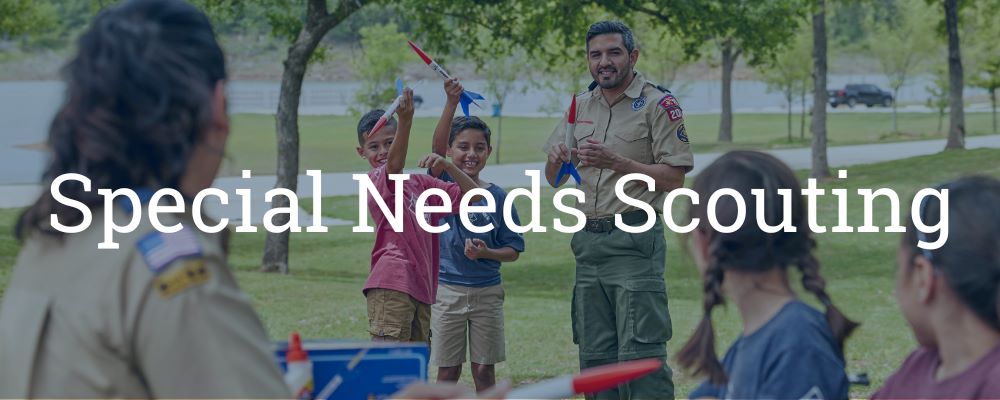Intellectually Disabled or Severely Physically Disabled Youth Members. In the discretion of the Executive Board, and under such rules and regulations as it may prescribe upon consultation with appropriate medical authorities, registration of youth who are either mentally disabled or severely physically handicapped, including the blind, deaf, and emotionally disturbed, over age 11 as Cub Scouts and over age 18 as Scouts BSA, and registration of young adults who are either intellectually disabled or severely physically handicapped, including the blind, deaf, and emotionally disturbed, over age 21 as Venturers, and the participation of each in the respective advancement programs while registered, is authorized.
Examples of conditions that, if severe, may be criteria that qualify an individual for registration beyond the age of eligibility include the following:
Autism Spectrum Disorders
Down Syndrome
Traumatic Brain Injury
Cognitive Disability
Developmental Disorders
Multiple Coexisting Disabilities
Multiple coexisting disabilities” refers to a diagnosis of two or more disabilities, none of which alone may be significant enough to warrant registration beyond the age of eligibility. For example, sight or hearing impairment, or other physical disabilities, or a moderate learning disability such as ADHD—each on its own—may be insufficient for qualification. It is possible, however, when considered in combination with other disabilities, including medications involved, that the cumulative impact may rise to the level of the severity requirement.
The Annual Health and Medical Record Form, No. 34605, must be used as part of the procedure for registering a severely physically disabled youth in Scouting. The person’s medical condition must be certified with a signed statement from a licensed physician. In the case of intellectually disabled or emotionally disturbed candidates, their condition must be certified by a statement signed by a licensed psychologist or psychiatrist. Individuals whose medical conditions are not severe, as defined in Clause 20, do not qualify as a Special Needs Scout, and may not register as such.
The form to request a Registration Beyond the Age of Eligibility can be found here.
Documentation that is requested:
- A letter from a parent or guardian describing the disability and its severity and permanence, and petitioning the council for approval of classification as a Scout with Disabilities or Special Needs and/or registration beyond the age of eligibility.
- A completed youth membership application or proof of current membership.
- A completed and signed BSA Annual Health and Medical Record form (parts A, B, and C), which is available online.
- A signed statement from a qualified health professional attesting to the nature of the disability, its severity, and permanent limitations connected with it. For physical disabilities, this must be a licensed physician; for developmental or cognitive issues, a licensed psychologist or psychiatrist, or as appropriate, a neurologist or other medical professional in a specialty related to the disability.
- A letter from the unit leader advocating and supporting the registration.
- Other supporting documentation, such as an Individualized Education Plan (IEP), treatment summaries, etc., which are optional, but can make a difference in the decision.
If done well, and available from the parents, an Individualized Education Plan can give valuable information on how to work with an individual Scout and help the Scout achieve at the best of his or her abilities.

